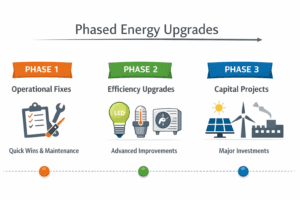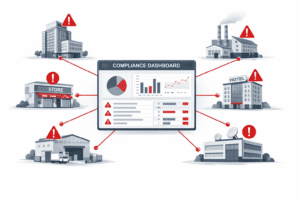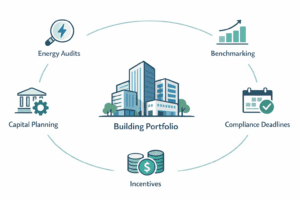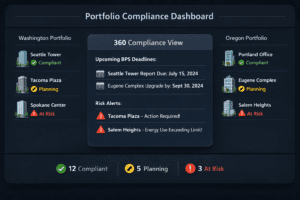Introduction
Property managers have a wide range of duties that come with managing a property. Energy compliance is one of the most crucial duties that is frequently disregarded. Energy compliance is the practice of following numerous energy laws, rules, and standards in order to save energy and increase sustainability. Property managers must be conscious of this because it is critical for the environment as well. The definition of energy compliance, the significance of energy compliance for property managers, and how property managers should prioritize energy compliance are all covered in this article.
Understanding Energy Compliance
Energy compliance is an essential component of sustainable property management. The ultimate objective of energy compliance is to ensure that properties operate efficiently, reduce their carbon footprint, and minimize energy costs.
Energy compliance regulations are typically set by government bodies at different levels. For instance, the United States Department of Energy sets energy efficiency standards for residential and commercial buildings. Similarly, states and local governments may have their own regulations that property managers must adhere to. For example, California has the California Energy Code (CEC), which sets energy efficiency standards for buildings in the state.
Energy ratings, on the other hand, provide information about a building’s energy efficiency performance. For instance, the US Environmental Protection Agency’s (EPA) ENERGY STAR program rates buildings based on their energy performance, with the most efficient buildings receiving an ENERGY STAR certification.
Energy audits are another type of energy compliance that property managers must comply with. An energy audit involves an assessment of a building’s energy usage, identifying areas where energy consumption can be reduced. Property managers can use the findings of an energy audit to make energy-efficient upgrades and improvements to their buildings.
Wondering how you should go about getting your property audited? Get in touch with us at Vertpro.com! VertPro® Nationwide Benchmark Platform uses the innovation of SaaS Technology for Building Owners & Property Managers to Simplify Energy Compliance with all 50+ Energy Benchmarking & Energy Efficiency Laws Nationwide. From Energy Benchmarking to Energy Audits/RCx Plus Construction Marketplace, VertPro® has you covered.
The Importance of Energy Compliance for Property Managers

There are several reasons why energy compliance is critical for property managers.
Firstly, implementing energy-saving measures can result in substantial cost savings. Energy-efficient buildings consume less energy, leading to lower utility bills, which can result in significant long-term cost savings for property managers. By prioritizing energy compliance, property managers can implement energy-efficient measures such as using LED light bulbs, upgrading HVAC systems, and installing smart thermostats.
Secondly, energy compliance can improve tenant satisfaction. Tenants are becoming increasingly aware of the impact their lifestyle has on the environment, and they prefer to live in buildings that prioritize sustainability. By complying with energy regulations and implementing energy-efficient measures, property managers can attract environmentally conscious tenants and improve tenant satisfaction.
Thirdly, energy compliance can significantly reduce the carbon footprint of a building, contributing to a healthier environment for the community. By reducing energy consumption and using renewable energy sources, property managers can significantly reduce greenhouse gas emissions and promote sustainability.
Fourthly, compliance with energy regulations and standards is a legal requirement in many regions. Failure to comply with these regulations can result in hefty fines and legal consequences for property managers. By prioritizing energy compliance, property managers can avoid legal trouble and ensure that their buildings are up to code.
Finally, energy compliance can increase the overall value of a property. Energy-efficient buildings are in high demand, and they often fetch higher rental and sale prices than buildings that are not energy compliant. By implementing energy-efficient measures and complying with energy regulations, property managers can increase the overall value of their properties.
Implementing Energy Compliance
Property managers that wish to cut energy use, increase sustainability, and adhere to energy rules must put energy compliance procedures into place. Property managers may successfully increase the energy efficiency of their buildings with the right strategy, despite the fact that putting energy compliance measures into place can first seem difficult.
First stage. Conduct an energy audit to put the energy compliance measures into place. An energy audit is a thorough analysis of a building’s energy usage that identifies high energy-consumption areas and assesses the effectiveness of the equipment and systems already in place. To conduct an audit of their properties, property managers can either engage energy auditors or use online energy audit tools.
Second stage. Create an energy management plan. The actions to increase energy efficiency are laid out in an energy management plan, together with precise energy-saving objectives and deadlines to accomplish them. The plan must be thorough and address every aspect of the structure.
Third stage. Find opportunities for energy savings. Property managers can seek methods to lower energy use, such as modernizing HVAC and lighting systems and putting in place water conservation measures. They might also think about putting in solar-powered energy systems. More on energy saving measures in the following section.
Fourth stage. Implement energy-saving solutions. To reduce energy usage, this entails implementing the necessary modifications and enhancements to current systems and machinery.
Common Energy-Saving Measures
Lighting upgrades are one of the most popular energy-saving strategies. Traditional lighting systems use a lot of energy and considerably increase the energy consumption of a building. Property managers can save up to 75% on lighting expenditures by switching out inefficient incandescent lighting for energy-efficient LED lighting. In addition to being more resilient than conventional lighting, LED lighting also requires less upkeep and replacement.
Another popular energy-saving measure is HVAC upgrades. A sizable amount of a building’s energy use is used by the heating and cooling systems. Property managers can lower energy use and boost energy efficiency by swapping out outdated, inefficient heating and cooling systems with more modern, effective versions. For instance, replacing your old thermostat with a smart one can help you manage the temperature and save energy.

Energy consumption reduction strategies also need to focus on water conservation. Water usage can be considerably decreased by installing low-flow faucets and showerheads, which will result in reduced energy use. A water-saving solution that decreases the need for watering is drought-resistant landscaping.
For property managers, using renewable energy sources is becoming more and more common. Property managers can generate renewable energy for their buildings by putting up solar or wind turbines, which will lessen their dependence on conventional energy sources and increase sustainability.
Finally, programs that aim to change behavior can be successful in lowering energy consumption. These initiatives seek to inform renters about how their behavior affects energy use and to persuade them to adopt environmentally friendly habits. Tenants might be urged to reduce their carbon footprint by using public transit or carpooling, unplugging electronics when not in use, and turning off lights when not in use.
Challenges in Energy Compliance
While energy compliance is important, it’s not always easy for property managers to implement. There are several challenges that property managers may face when trying to improve energy compliance.
One common challenge is a lack of resources and expertise. Property managers may not have the necessary expertise or resources to develop and implement energy-saving measures effectively.
Another challenge is resistance to change. Tenants and staff may resist changes in their behavior or building operations that are necessary to achieve energy compliance goals. Funding and budget constraints are also common challenges. Energy-saving measures often require significant upfront investments, and property managers may not have the necessary funds to make these investments.
Finally, limited access to energy data can make it difficult for property managers to identify areas of high energy consumption and develop effective energy management plans. Despite these challenges, property managers can overcome them by seeking support from experts in the field, educating tenants and staff on the benefits of energy compliance, exploring funding opportunities, and investing in energy monitoring and management systems. With determination and persistence, property managers can successfully improve energy compliance and contribute to a more sustainable future.
Conclusion
In conclusion, energy compliance is critical for property managers who want to improve the energy efficiency of their buildings and contribute to a more sustainable future.
By implementing energy-saving measures, property managers can reduce energy consumption, cut costs, and improve tenant satisfaction. Overcoming challenges such as a lack of resources and expertise, resistance to change, funding and budget constraints, and limited access to energy data can be challenging.
Therefore, we encourage property managers to prioritize energy compliance and work towards making their buildings more energy-efficient and sustainable.
Together, we can build a greener future.
Now that you have a fair idea of what Energy compliance entails, it’s time to find out if your property meets the requirements. All you have to do is sign up for VertPro® and in 30 minutes or less our Energy Star Portfolio benchmark compliance technology platform report will help your buildings meet nationwide energy efficiency ordinance requirements.
Visit VertPro.com for more details!















